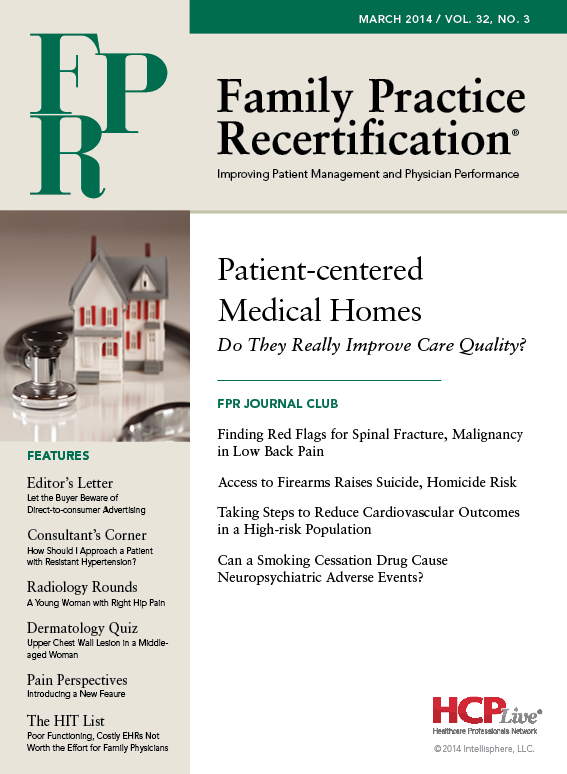Publication
Article
Family Practice Recertification
Can a Smoking Cessation Drug Cause Neuropsychiatric Adverse Events?
Author(s):
When encouraging and supporting patients to quit smoking, varenicline is unlikely to increase the risk of neuropsychiatric adverse events such as suicide, depression, and aggression, even in patients with pre-existing psychiatric illness.
Review
Gibbons RD, Mann JJ. Varenicline, smoking cessation, and neuropsychiatric adverse events. Am J Psychiatry. 2013 Dec 1;170(12):1460-7. http://ajp.psychiatryonline.org/article.aspx?articleid=1738032.
Study Methods
This review consisted of 2 parts, the first of which involved a reanalysis of 17 randomized placebo-controlled trials (RCTs) of varenicline conducted by Pfizer, the drug’s manufacturer, using intent-to-treat longitudinal data to examine smoking abstinence, neuropsychiatric adverse effects, and nausea in patients with and without psychiatric disorders.
For the second part of their review, the authors reexamined a retrospective cohort study by the US Department of Defense (DOD), which relied on data from the Military Health System comparing the 30- and 60-day rates of neuropsychiatric adverse events for varenicline and nicotine replacement therapy. The conditions analyzed in the observational study included anxiety disorder, depressive disorder, schizophrenia, episodic and mood disorders, delusional disorders, posttraumatic stress disorder (PTSD), and suicide attempts.
Patient Demographics
The Pfizer data included 17 RCTs with a total of 8,037 participants. Across those studies, 1,004 participants had a current or past psychiatric disorder, including depression, anxiety, schizophrenia, psychosis, panic disorder, mood disorders, and personality disorders.
The observational study included complete neuropsychiatric event data on 35,800 outpatients and inpatients, none of whom had received varenicline or nicotine patch treatment within the past 180 days. Propensity score matching was used to create a matched set of patients based on demographics, past-year psychiatric illness, and psychiatric and smoking cessation medications.
Intervention and Control
In the RCTs, 4,823 participants were treated with varenicline, 795 received bupropion treatment, and 3,204 were given placebo for an average of 11.6 weeks. In the observational study, 19,993 patients were treated with varenicline, while 15,867 received nicotine patch therapy.
Results and Outcomes
Both suicidal behavior and ideation — as well as their possible causes, including depression and aggression/agitation — were examined in the RCTs. Varenicline did not have a significant effect on depression, aggression/agitation, or suicidal thoughts or behavior; there were no suicides in the varenicline group. Additionally, the discontinuation of varenicline treatment had no effect on depressed mood disorder and disturbance, and the presence of pre-existing psychiatric illness did not influence the effectiveness of varenicline treatment. However, varenicline significantly increased the rate of nausea.
Smoking abstinence was significantly greater for patients treated with varenicline than placebo or bupropion. After 12 weeks, the probability of abstinence for participants treated with varenicline was 68%, compared to 30% for the placebo group. Additionally, 3 studies that included bupropion and varenicline found the probability of smoking abstinence was 64% for subjects treated with bupropion and 78% for those treated with varenicline after 12 weeks.
In the DOD observational study, the rate of neuropsychiatric adverse events was significantly lower for varenicline than nicotine patch therapy following propensity score matching. Transient mental disorder (which was not specifically defined by the study authors) was the only disorder observed more frequently in patients treated with varenicline, but the difference was not statistically significant.
Conclusion
This review found no increased risk for neuropsychiatric events — including depression, agitation/aggression, and suicidal ideation and behavior — in patients treated with varenicline. Additionally, varenicline treatment showed a significant increase in smoking abstinence rates compared to bupropion and placebo. Nevertheless, nausea was a common side effect of varenicline.
Commentary
In 2009, the US Food and Drug Administration (FDA) issued a black box warning based on post-marketing adverse event reports that varenicline may be associated with an increased risk of neuropsychiatric events, including agitation, depression, and suicidal thoughts, behaviors, and attempts. Since then, there has been continued debate in the literature over the safety profile of varenicline, especially in patients with pre-existing psychiatric comorbidities.
This analysis of 17 RCTs included 2 recent trials populated only by patients with a history of schizophrenia and depression. Both demonstrated no increased risks for neuropsychiatric adverse events from varenicline treatment among those with former or current psychiatric comorbidities.
One strength of the observational study is its inclusion of both inpatient and outpatient events, given the original analysis only looked at inpatient hospitalizations. Patients included in the study were not limited by inclusion or exclusion criteria, as would be the case in an RCT, which makes it easier to apply the outcomes to most clinical settings.
Limitations of this paper comprise its dependence on industry-sponsored RCT data. Although the authors indicated Pfizer was not involved in their analysis or writing, the manufacturer did review the final manuscript, and one of the authors has served as an expert witness for Pfizer. Moreover, critics have noted the authors’ reliance on unpublished clinical trial data prevents an independent assessment of their methods. However, the results of the observational study corroborated the RCT findings.
When encouraging and supporting patients to quit smoking, varenicline is unlikely to increase the risk of neuropsychiatric adverse events such as suicide, depression, and aggression, even in patients with pre-existing psychiatric illness. Moreover, varenicline may be more effective than bupropion in regard to smoking cessation.
About the Authors
Rachel K. Berlin, MS IV, is a medical student at the University of Massachusetts Medical School in Worcester, MA.
She was assisted in writing this article by Frank J. Domino, MD, Professor and Pre-Doctoral Education Director for the Department of Family Medicine and Community Health at the University of Massachusetts Medical School and Editor-in-Chief of the 5-Minute Clinical Consult series (Lippincott Williams & Wilkins).






